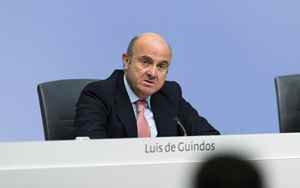(Finance) – If the European Central Bank (ECB) ends the APP program asset purchases it expires a Julyis “theoretically possible” an increase in interest rates in the same month. She affirmed it Luis de Guindos, Vice-President of the ECB, stressing that however it is necessary to “keep in mind that we have now clearly disconnected the end of the APP at the first rate hike, so a rate hike must not happen automatically once the APP is terminated”. In essence, Frankfurt could spend some time and remain dependent on the data it will have available at that time.
“My opinion is that the program is expected to end in July and for the first rate hike we will have to see our projections, the different scenarios and, only then, decide. And nothing has been decided so far, the Spanish economist pointed out in an interview with Bloomberg. Pressed on the most likely end of the APP, he said whether it “happens at the beginning or at the end (of the third quarter, ed) is essentially a setup monetary policy and, in my opinion, is not a determining factor in itself. That said, at the moment I don’t see any reason why we shouldn’t stop our APP program in July. “
When asked whether there is a clear understanding at the ECB about where the neutral reference rate has stabilized, de Guindos replied: “It is very difficult to assess unobservable variables. This applies to potential growth, output gaps and also for the natural interest rate. The natural rate has decreased over the past two decades due to structural factors such as demographics, globalization and digitalization. But now the world is changing. I can’t give you a figure, I don’t think anyone can. But I think the natural rate is now clearly on the rise“.
The ECB official said the fragmentation of financial markets it is not a new problem, but that “mixing monetary policy with the fight against fragmentation would be a mistake and the Governing Council is aware of this. We would like to avoid fragmentation that is not idiosyncratic, that is exogenous”. “The main source of potential fragmentation has to do with diverging countries’ fiscal profiles and potential growth – he added – Monetary policy can do something, but to minimize the potential risk of fiscal fragmentation. in the long run they are structural reforms needed to strengthen productivity and competitiveness“.
de Guindos stressed that he had “always been in favor of a centralized fiscal capacity” at the eurozone level, which would make even more sense in the context of the war, but in any case “it is up to the European Council to take a decision on this”. When asked how much this would make a difference in financial markets, in terms of sovereign yields, he replied: “So far we have not seen a fragmentation of the financial markets. We have seen a small widening of spreads for Italy, Spain or Portugal. But this it is not a fragmentation like the one we had in 2010-2012. It is completely different. And this despite the fact that we are normalizing monetary policy. We saw some upward moves mainly at the end of the yield curve, but the fragmentation was contained. ”
